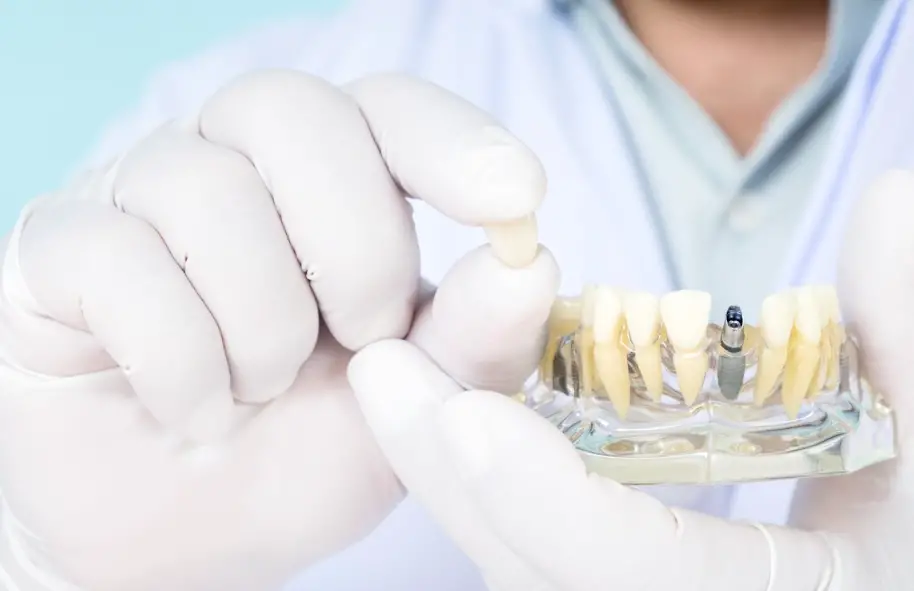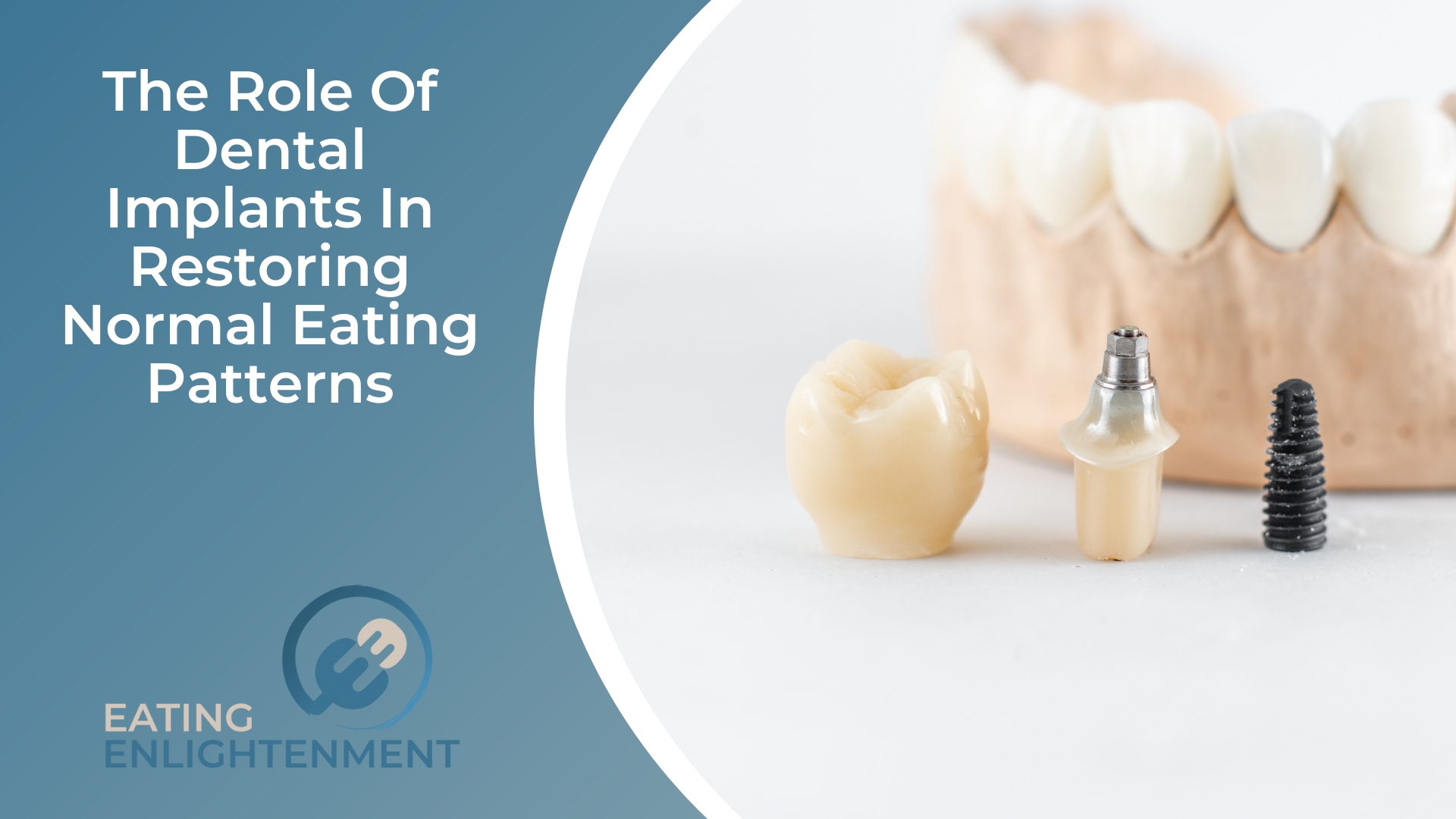Dental implants play a pivotal role in modern dentistry, offering a durable and effective solution for replacing missing teeth. Their significance extends beyond merely filling gaps in one’s smile; dental implants are instrumental in restoring normal eating patterns, which is crucial for both physical health and psychological well-being.
This article delves into how dental implants contribute to regaining regular eating habits and the overall impact this has on an individual’s quality of life.

What Are Dental Implants?
Dental implants, crafted from titanium, serve as artificial roots for teeth. These are professionally implanted into the jawbone to effectively replace teeth that are missing. They serve as a sturdy foundation for permanent or removable tooth replacement, such as crowns, bridges, or dentures designed to match natural teeth.
In addition, they offer a widely favored and successful long-term remedy for individuals grappling with missing, failing, or chronically problematic teeth, owing to their ability to fit, feel, and perform indistinguishably from natural teeth.
Types Of Dental Implants
There are several types of dental implants, each with unique features designed to accommodate various dental conditions and patient needs. Understanding these differences is crucial for selecting the most appropriate type of implant for an individual’s specific situation.
Endosteal Implants
Endosteal implants are the most used type of dental implant. They are typically made from titanium and shaped like small screws. These implants are placed directly into the jawbone, serving as an artificial root to hold the replacement tooth or teeth. Once the implant has integrated with the bone, a process known as osseointegration, an abutment, is attached to the implant to secure the artificial tooth.
Subperiosteal Implants
Subperiosteal implants are an alternative to endosteal implants and are placed under the gum but on or above the jawbone. Typically, patients who lack a healthy jawbone and prefer not to undergo a bone augmentation procedure to rebuild it may use this type of implant.
Zygomatic Implants
Surgeons use zygomatic implants in rare cases of severe bone loss in the upper jaw when neither endosteal nor subperiosteal implants are viable options. Generally, they anchor these implants in the zygoma, or cheekbone, instead of the jawbone.
Mini Dental Implants (MDIs)
Dentists often use mini dental implants, which are narrower than traditional dental implants, to stabilize a lower denture. They place MDIs using less-invasive techniques and sometimes employ them as a temporary solution or in situations where traditional implants are not an option.
All-on-4®
The All-on-4® treatment concept enables the support of an entire arch of teeth with just four implants. Dentists often use this technique as an alternative to traditional dentures for patients who have lost all their teeth in one or both jaws.
The Challenges Of Missing Teeth
The loss of teeth entails more than just a visible gap; it impacts various functions, leading to a spectrum of physical and psychological complications, such as the following:
1. Disruption Of Normal Eating Patterns
One of the most immediate and noticeable impacts of missing teeth is on an individual’s eating habits. Teeth play a crucial role in the digestive process, starting with the mechanical breakdown of food. The absence of teeth makes chewing difficult or even impossible for certain foods, leading individuals to change their diets significantly. They often resort to softer foods that are easier to chew but may lack the diverse nutrients needed for a healthy diet.
2. Gastrointestinal Issues
The process of digestion begins in the mouth, where teeth break down food into smaller, more manageable pieces, making it easier for the stomach and intestines to digest further and absorb nutrients. When chewing is inefficient, larger pieces of food enter the digestive tract, leading to a range of gastrointestinal issues, such as indigestion, bloating, and constipation.
3. Oral Health Complications
Missing teeth can also lead to significant oral health complications. The gaps left by missing teeth can cause the remaining teeth to shift, move, or even rotate into the empty spaces, affecting the bite and leading to jaw pain and headaches. This misalignment makes teeth harder to clean, increasing the risk of tooth decay, gum disease, and further tooth loss.
4. Psychological Impact
Beyond the physical health implications, missing teeth can significantly affect psychological well-being. Many people with missing teeth experience a loss of self-esteem and confidence, particularly if the gaps are visible when smiling or talking. This can lead to social withdrawal, anxiety, and depression, further emphasizing the importance of addressing tooth loss with effective solutions like dental implants.
5. Nutritional Deficiencies
Nutritional deficiencies are a common consequence of compromised eating patterns due to missing teeth. Essential nutrients such as vitamins, minerals, and fiber, found in fruits, vegetables, nuts, and meats, become more challenging to consume. This can lead to deficiencies in essential nutrients like vitamin C, calcium, and iron, impacting various bodily functions, from immune response to bone health.
Benefits Of Dental Implants In Restoring Eating Patterns
Restoring normal eating patterns with dental implants significantly enhances an individual’s quality of life by addressing the multifaceted challenges posed by missing teeth. Here are some of its advantages:
1. Improved Functionality
Dental implants are designed to integrate with the bone, providing a stable and secure foundation for replacement teeth. This integration ensures that implants don’t slip or move. With the stability provided by dental implants, individuals can bite and chew naturally, allowing them to enjoy a broader range of foods, including those that are harder or require more effort to chew, such as apples, carrots, and nuts.
2. Enhanced Comfort And Confidence
The secure fit of dental implants eliminates the discomfort often associated with removable prosthetics, which can rub against gums and cause sores. Implants feel more like one’s natural teeth, and with this increased comfort comes a boost in confidence. Dental implants address these issues by providing a replacement that is visually indistinguishable from natural teeth, restoring the aesthetic appearance of the smile and, with it, the individual’s self-esteem.
3. Nutritional Benefits
One of the most significant impacts of dental implants is on an individual’s nutritional health. The ability to chew effectively is crucial for the digestion and absorption of nutrients. Dental implants allow for a diverse and balanced diet, enabling the consumption of a wide variety of foods rich in essential nutrients. This includes crunchy fruits and vegetables, which are important sources of vitamins, minerals, and fiber, as well as meats and nuts, which provide proteins and healthy fats.
4. Preventing Bone Loss And Maintaining Facial Structure
Dental implants also play a critical role in maintaining oral health by stimulating the jawbone and preventing bone loss. When teeth are lost, the jawbone no longer receives the necessary stimulation from tooth roots, leading to resorption, a process where the bone begins to deteriorate. Dental implants mimic the stimulation provided by natural tooth roots, preserving bone mass and maintaining the natural shape of the face.
Conclusion
As advancements in dental care continue to evolve, dental implants stand as a testament to the possibilities of modern dentistry, empowering individuals with a solution that closely mimics natural teeth. As such, dental implants are not just about restoring teeth but about enriching lives, one smile at a time.



